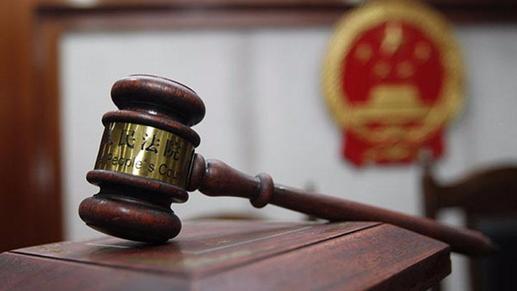 This undated photo shows a gavel in a court in China. (PHOTO / IC)
This undated photo shows a gavel in a court in China. (PHOTO / IC)
BEIJING – Courts in China continued to deepen judicial transparency, with more verdicts disclosed online, according to an annual work report of the Supreme People's Court, the country's top court.
The president of the Supreme People's Court, Zhang Jun, and the procurator-general of the Supreme People's Procuratorate, Ying Yong, delivered the work reports on Friday and submitted them to the ongoing second session of the 14th National People's Congress, the country's top legislature, for deliberation.
READ MORE: Criminal justice: China’s reforms help victims and point the way
More than 2.16 million of court rulings have been disclosed online since the beginning of this year, up 111.6 percent year-on-year, the SPC report showed.
In 2023, prosecutions for crimes such as infringement of trademark rights, patent rights, copyright and trade secrets totaled at affecting 18,000 people
Of the rulings, 35,000 came from the SPC and high people's courts nationwide, an increase of 4.7 times year-on-year, the report said.
Courts across the country have attached greater importance to protecting the privacy of individuals and enterprises involved in the cases while uploading the verdicts on the internet, it said.
In addition, since the start of last year, the top court has been disclosing judicial data every three months, it added.
Protecting innovation-driven development
China's procuratorates and courts have actively leveraged their functions to safeguard and serve innovation-driven development, as stated in the annual work reports of China's top procuratorate and the top court.
In 2023, prosecutions for crimes such as infringement of trademark rights, patent rights, copyright and trade secrets totaled at affecting 18,000 people, marking a 40.8 percent year-on-year increase. Efforts have been made to strengthen the protection of trade secrets in litigation proceedings to prevent "secondary leakage", according to the SPP.
The supervision of civil and administrative litigation cases involving intellectual property reached 2,508 cases, a 270 percent increase compared to 2022. Additionally, the procuratorates also handled 873 IPR public interest litigation cases, along with the launch of special supervision on malicious litigation involving IPR.
ALSO READ: China to strengthen enforcement of court orders
Last year, the SPP also introduced 45 measures for procuratorial organs to handle intellectual property cases to strengthen the comprehensive protection of IPR.
In terms of the trial of IPR, the people's courts nationwide concluded 490,000 IPR cases last year, representing a 1.8 percent increase compared to the previous year, according to the SPC work report.
Furthermore, punitive damages were applied in 319 cases, marking a 117 percent year-on-year increase, with the awarded amount reaching 1.16 billion yuan ($161.2 million), a 350 percent increase compared to 2022.
Clarification on justifiable defense
Justifiable defense — Article 20 of the Chinese Criminal Law — saw an increase in application by judicial authorities while dealing with cases last year, responding to public concerns and upholding the justice, according to the reports.
Both the reports highlighted the justifiable defense, which has been regarded as a "dormant clause" due to challenges in interpretation and the influence of misconceptions, such as "whoever is injured or killed is right", in China for some time.
Many internet users once commented that the true meaning of the law should be to increase the liability for wrongdoers, rather than burdening good people.
To address public concerns, judicial authorities, in recent years, issued guidelines to further specify circumstances in which justifiable defense should be applied, making it no longer an illusory provision.
Last year, 261 people were not arrested or prosecuted after their acts were identified as justifiable defense in line with the law, up 25.5 percent year-on-year, according to the SPP report.
The SPC report also added that from 2021 to 2023, Chinese courts announced 77 defendants not guilty after their behaviors were deemed as justifiable defense.


